TR Interview: Jeffrey Combs is Rather Good
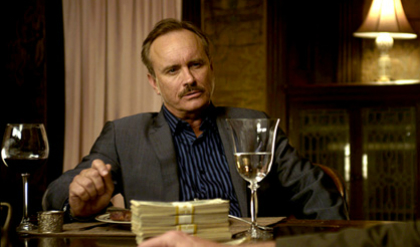 |
Whether you know him best as Herbert West the Re-Animator, or his multiple Star Trek franchise roles that include Weyoun and Shran, anyone who’s a fan of Jeffrey Combs’ ability to embody diabolical genius will probably want to check him out in Would You Rather. As Shepard Lambrick, a slick salesman promising great opportunity, he’s the rich and eccentric host of a dinner party game of deadly dares.
As himself, Jeffrey Combs is someone a fanboy can listen to forever, with that distinctive voice of his. So it was a pleasure to talk to him at length about Would You Rather, with a little Re-Animator and Edgar Allan Poe thrown in the mix.
Warning: although this interview does not reveal who makes it out alive – if anyone – in Would You Rather, there are some spoilers. If you have seen it, however, it may clarify a few points.
Luke Y. Thompson: When I first heard about this film and I saw your name attached, I thought, “I bet they’re just throwing us a cameo so all us fans will go see it.” But I was happy to see that you are basically the main role. How did this come about?
Jeffrey Combs: Yeah, thanks. Yeah, that can happen, that cameo stuff. It’s a little trick that they’ll pull every once in a while. “Hi, Jeff! Would you like to do this movie, not much of your time?” And what do they do? They turn around and blast your name on it, and then ultimately the fans are tricked, or disappointed – they feel jilted by that. Not this time, though. Maybe a little too much of me! (laughs)
LYT: I don’t know if there’s any such thing.
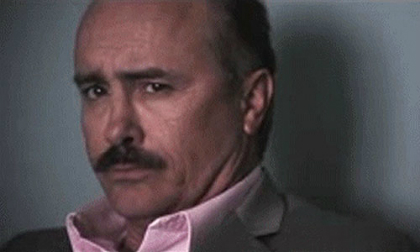 |
LYT: I was wondering when I was watching it, was there any Nicolas Cage influence here? The way the hair was, and the suit, and your gestures, it sort of reminded me of him a bit.
JC: Not even on my periscope there. Not even a thought. Great minds think alike? Same hair line? I don’t know. No, I didn’t really try to channel that at all.
LYT: When you play a character like this, you’ve got to obviously find the sympathetic thing in him, and understand his motivations. One thing I never quite figured out was what was driving him to do this. Is that a spoiler for subsequent movies or do you have any insight as to why he did these things?
JC: I think that it was actually on purpose that you don’t know, and why you are sort of in a quandary. I think it was the intent for the writer and the director for that to never be explained. It’s one of the inexplicable things about evil, is that a lot of the time you just are never going to understand what the hell prompts someone to do that. You can’t give an explanation, because I don’t think there ever is a justifiable one.
The only thing that we could kind of come up with in a weird sort of way is that Shepard Lambrick is a victim of his own lineage. This is a family legacy, a sadistic streak started generations ago, and passed down from father to son, indoctrinated from an early age. I decided in my own mind that my wife is not in the picture. In fact, women are not. Women are merely, “Give me a son so I can pass this on then I will get rid of you one way or another so that there’s no distraction.” It happened to me, it happened to my father, and to his father and to his father, so there is this family dynasty that has this hideous manifestation. I don’t know anything else; this is the way I was brought up, and it’s the way I’m bringing up my own child, trying to convey that the game has rules that can’t be broken, even though it has some flexibility to it.
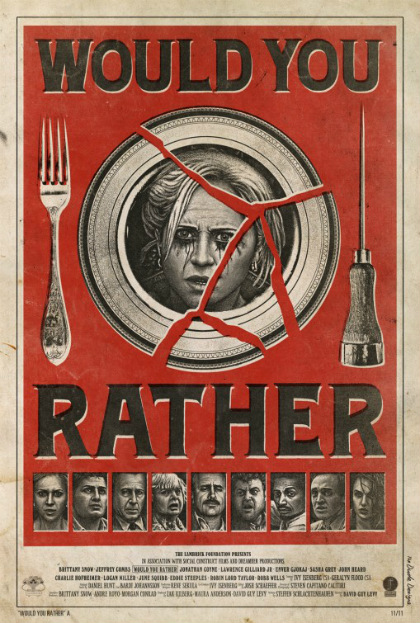 |
You see in the one scene that I’m so frustrated with my son, because he seems to be crossing some line, which is interesting because, what, I’m not crossing some lines? But there are rules that you have to follow, even though it’s in a dark, dark game. So, that’s sort of my answer. You can’t explain, and neither can you be sympathetic. It’s interesting that at the end, I point out to [the winner]“You see? We kept our word. We keep our word. You win, and we will fulfill our promise.” It’s like a contract, and very proud of that. So there’s a twisted ethic going on here, but it’s endemic and inexplicable.
LYT: It’s also interesting that you have the Lambrick Foundation copyright under the title, like it’s a propaganda film of sorts.
JC: (laughs) That’s the producer and director’s very, very dark and sick little joke about the whole thing, that the movie has been funded by the Lambrick Foundation; they set up a big production company for the movie.
LYT: Which would imply that they want people to know about the game, they think it’s actually going to be a draw, in a perverse kind of way.
JC: Well, in a way. I think it’s a tongue-in-cheek kind of joke that you get in the end, like “Wow! Pervasive power here.”
LYT: How long was the shoot?
JC: It was three weeks. We shot for three weeks, all in one location, fortunately, and very rarely does this happen, in sequence. We got to shoot all of the dinner sequence start to finish. “OK, we do that, now we do that, and we move you here.” That really informed and helped us as a cast to really build intensity.
LYT: I was wondering if there was a way the player could win by being the most self-sacrificial and inflicting the pain on themselves carefully. Do you think there was?
JC: No! I think there are aspects of that where people say “I’m not going to hurt somebody else, I’ll take the hit.” But we see what happens to the Afghan vet, right? He’s given the opportunity to not take it, and he says “No, I don’t want to hurt anybody any more, give it to me.” It’s almost Christ-like, in a way, but he does not survive. Maybe he does; they do drag him out hanging on by a thread, so maybe he does survive, we just don’t know.
LYT: But he also provoked the son and made himself the target; maybe if he hadn’t done that…
JC: Unknowingly, he stood up for himself and challenged the power. And what happened is the spotlight of the game veered right over and he became target #1. The game was not going to go that way until he opened his mouth. You notice there’s no scene between my son and I, but obviously my son went and told me, and I come in and, “OK, son, I’ll take care of it.” And boom! You are screwed, dude! See what happens? And that’s the sick thing about sadism – do you all see what happens when you challenge us in any way. And it happens again, when my son had to leave the game, and the gambler says “Gee, that’s too bad.” And who gets picked next? “You’re next!”
Ultimately, I have total control. I’m the puppeteer. I’m determining the flow of the night, to a degree. On the other hand, when the cards are brought out the end, and there are four people left, those are totally random. In my mind, I don’t know who’s going to get what. If I did, then really some of the fun would be gone. Like I said before, this is like a cat, toying with a bird that is injured. They don’t kill it right away. They do not – in fact, they kill it at the last minute. They want it to suffer, and wiggle, and writhe, for as long as possible, and we view that as being mean, or sadistic, but the cat doesn’t see it that way. In a way, for the cat, it’s just simple instinctual training, working on its reaction time, I don’t know – but that’s sort of what’s going on here, and it’s really creepy.
LYT: How do you think you would play if you, Jeffrey Combs the actor, were in a situation like that in real life?
JC: I would not survive! I would not survive. I don’t know where in the pecking order I would go, but I don’t think I could have handled it. I would have probably fallen apart a lot earlier than a lot of these people. They’re all victims. They’re all doomed from the get-go. They just don’t know it.
LYT: At our website, we also cover toys a lot, and one of the great toys that never came out was that Re-Animator action figure of you that SOTA was going to do. Has there been any talk of doing another one by any other companies?
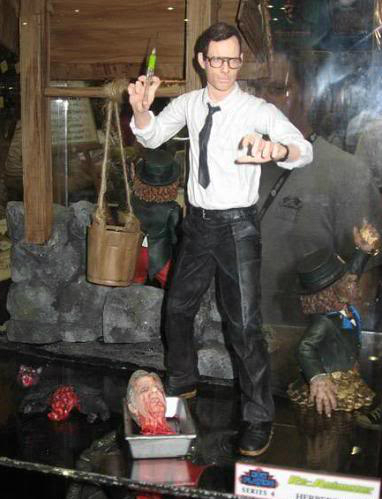 |
| Photobucket user funxnotdead |
JC: No, the only thing that I know of in terms of action figures, there are a couple of Herbert West new ones out there, but they’re not “action” figures. There’s a resin kit that’s very rare of Herbert West that’s very good. You know, you have to paint it and all of that. It’s not articulated, it doesn’t move or anything. I don’t know. That was going to happen, and then it didn’t.
LYT: Has there ever been any more talk of doing more Re-Animator movies, or is that pretty much dead at this point?
JC: It rears up every once in a while, but the landscape with movies has really changed in the last 4 or 5 years. Delivery systems are different. This movie, Would You Rather, is video on demand. It had a small theatrical release, but it’s a video on demand and that’s just where it goes. I just don’t know. There are also demographics. I’m sure that Brian Yuzna, who owns the rights to Re-Animator, would love to have another pass at a Re-Animator sequel, but someone’s got to step up and fund it. And when you get into that, there’s the crux of the problem – bean counters.
Here’s what I think will happen. The name is so well-known, it’s a cult classic, that someone at some point will give Brian a lot of money for the title, and they’ll reboot it, thinking they can just tell the same story again, but with younger, fresher actors. Re-do it, update it, and we know what that will have to do.
LYT: It would be hard to find a cast that could beat the first one.
JC: Well, hubris and rational thinking – you know what I mean? They’ll get past that and go “We can do it.” And that will be a weird day for me.
LYT: It’s sort of like reanimating the dead; just because you can do it, doesn’t mean you should.
JC: That’s right! And the weird thing about Re-Animator is it’s like one of its corpses – it’s the movie that doesn’t die! It keeps coming out with different releases. I think Blu-ray just came out last year. It really holds up, because it’s not beholden to aging CGI techniques, where you see an old movie with early CGI and you go “Wow! That was pretty cheesy!” It was all sort of hands-on effects, on the spot, and that’s far more forgiving. It’s just clever editing and camera tricks. No one’s pulling out a big ol’ cell phone that makes you say “Whoa!” So it fortunately has sort of a timeless quality to it, to a degree.
LYT: Have there been any talks of taking your Edgar Allan Poe performance into the realm of cinema as opposed to the stage?
JC: Actually, right now we’re waiting for the screenplay version to be finished, so we could examine maybe a Kickstarter campaign, or finding some sort of a sponsor, as they used to back in the Renaissance; you always had a benefactor, someone who financed your project. So somebody who could step up; I don’t think it would cost really a whole lot of money, in relative terms, to bring it to the cinema, expand it out a little bit.
Do you know much about the show? It’s basically Poe at an imaginary recital, telling his poems and reading one of his stories, and getting drunker as the evening goes along. But our idea would be that once he starts a poem, we would actually (in the film version), we would go there, into that world that he’s creating with his words, and have visuals to go along with it, then come back to the recital.
LYT: I’m sold.
JC: We’re hoping that we can do it, but with the economic downturn, these things have proven to be more and more difficult to get going.
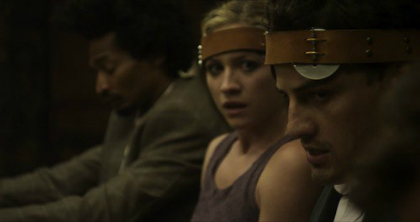 |
LYT: When you were doing Would You Rather, were you aware of the British game show of the same name?
JC: No, not at all. The only thing that I was aware of was the director saying that there was another project in development called Would You Rather, but it had a completely different take. We beat them to it, I would imagine.
LYT: When I saw the Saw movies, I immediately thought of the playground game “would you rather”; would you rather die or get your hand chopped off?
JC: Honestly, I haven’t seen much of those Saw movies. Is that sort of what it is? A Sophie’s choice where neither option is good?
LYT: It’s part of it. It’s basically, you get stuck in a trap, and if you don’t act fast enough in a way that will mutilate yourself, or kill somebody else, you’re going to die. You guys really got to the essence of the game. It was more of a subtext thing in Saw.
What are your next projects that you’re excited about, other than the possible Poe Kickstarter?
JC: Well, actors never know. I’ve been doing a lot of voice-over animation stuff. I have a movie that’s making the rounds right now, called Motivational Growth. I’m not really in the movie, my voice is. It’s about a disturbed young man who hasn’t left his filthy apartment in a year and a half, and the mold that’s growing in the corner of his bathroom starts talking to him and giving him advice, so my career has now reached the point where I am portraying fungus! (laughs) I hope good things for Would You Rather.
—
Would You Rather opens tomorrow.
